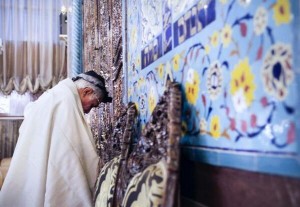 In the wake of startling tweets from�Iran�wishing Jews a happy Rosh Hashanah,�an unusual public debate has broken out among the country's leadership over whether officials should use�social media�to send policy messages to a global audience.
In the wake of startling tweets from�Iran�wishing Jews a happy Rosh Hashanah,�an unusual public debate has broken out among the country's leadership over whether officials should use�social media�to send policy messages to a global audience.Over the past several years, Iranian officials � or their representatives � have opened accounts on Twitter, Facebook and Instagram. But social media use by officials has gained a whole new level of attention since Iran's new president, the moderate cleric Hassan Rouhani, and his foreign minister, US-educated Mohammad Javad Zarif,�appeared to send Rosh Hashanah greetings to Jews celebrating the new year�last week.
Last Saturday, a taskforce to study the legality of Iranians' online activity announced that it would begin an investigation of the use of social media by officials. The taskforce existed before the appearance of the high-profile tweets, and the announcement did not mention Twitter, but the timing of the social media investigation hardly seemed coincidental.
"Our office will soon study the content of pages of some ministers on various social networks like Facebook. Some people have said that there is criminal content posted in such pages, which we have to study in our office and then give our assessment," the taskforce's secretary, Abdolsamad Khoramabadi, told the Fars News Agency last Saturday.
The taskforce includes a variety of officials, many appointed by Rouhani, making it likely that it will not seek to make social media off-limits to officials but will open a larger conversation about the new communication channels.
Hardline defenders of the Islamic republic's anti-American and anti-Israeli policies are strongly criticising how the new government is interacting with the rest of the world online.
In a�brief exchange on Twitter�last week between Zarif and the daughter of US House Democratic leader Nancy Pelosi, Christine Pelosi wrote: "The New Year would be even sweeter if you would end Iran's Holocaust denial."
Zarif's tweet responded, "Iran never denied it. The man who was perceived to be denying it is now gone" � a reference to former president Mahmoud Ahmadinejad.
Hossein Shariatmadari, the editor of the ultra-conservative Kayhan newspaper, wrote in an editorial last Sunday: "Given Zarif's status as the minister of foreign affairs and his deep knowledge of diplomacy, what we witnessed in these tweets was strange and unexpected." Shariatmadari also said that the interaction was an insult to Ahmadinejad.
Although access to social media sites, and millions of other websites, is blocked to average Iranians, nearly all of the presidential candidates in the June election used social media as campaigns tools, including hardliner Saeed Jalili. Anti-filtering software is common among Iran's tech-savvy population, but authorities have gained the upper hand in recent months, making it difficult to reach many popular websites.
After he was elected, Rouhani said there was no need to block access to these websites, and one of his most influential supporters, former president Akbar Hashemi Rafsanjani, has agreed restrictions should be eased.
An increasing number of elected officials are saying the same thing. Last Sunday, Fararu, a domestic news site, interviewed several lawmakers who were in favour of more open access to the internet. "There is no need for filtering in this third millennium, which is an era for information and communication," said Kamaladdin Pirmoazen, a member of parliament.
Esmail Jalili, another lawmaker, called the use of social media by officials an "opportunity", and said that "we have to trust our people and let them have greater access." So far there has been no movement on the issue.
Improving Iran's global image was a�top Rouhani campaign promise, but some officials are still not completely prepared to accept the use of modern tools of mass communication.
Rouhani's media adviser sidestepped the issue, sparking confusion about whether the president actually made or approved the Rosh Hashanah tweet. Mohammad Reza Sadeq said Rouhani does not personally maintain a Twitter account, but added: "Proponents and fans of Mr Rouhani were active in cyberspace during the recent presidential election in Iran. Of course, such activities are fully normal during election campaigns, and some of them might continue their operation even after the election."Other officials have been more transparent about their online activities.
Marzieh Afkham, Iran's first female foreign ministry spokesperson, wrote on her Facebook page: "I've been asked many times who is running this page and my response is that it is my personal page. I set it up after our minister, Dr Zarif, made the progressive act of starting his page."
Zarif has amassed more than 150,000 likes on Facebook and more than 14,000 Twitter followers, most of them since last week.
By The Guardian
The Iran Project is not responsible for the content of quoted articles.










